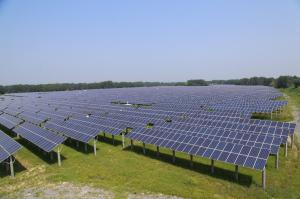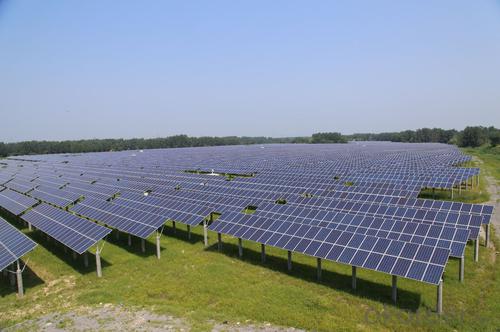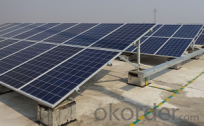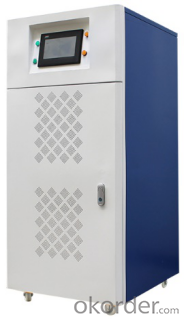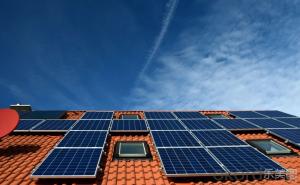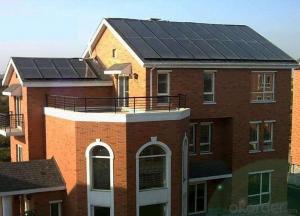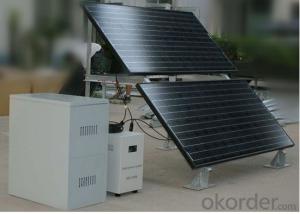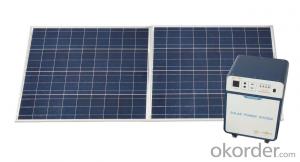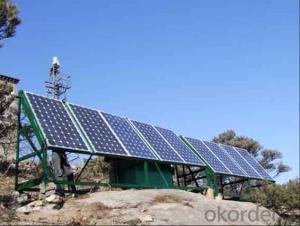30kW Solar Off-Grid Power System - Solar Energy Systems in Geelong
- Loading Port:
- China main port
- Payment Terms:
- TT OR LC
- Min Order Qty:
- 1 set
- Supply Capability:
- 500 set/month
OKorder Service Pledge
OKorder Financial Service
You Might Also Like
Specification
1. Technical parameters of 5kw Solar Off-grid Power System 30KW
-Solar panels
Power(Pmax): 300 Wp
Dimension: 1640x992x40 mm
Working Voltage(Voc): 39.7V
Working Current(Imp):9.32A
Weight: 20 kg
-PV Inverter with controller
Efficiency: >85%
Pure sine wave
AC 220V/380V 50/60Hz output
Working Temp: 0℃~40℃
Battery overvoltage protection,undervoltage protection,overload protection,short circuit protection, overtemperature protection,etc.
650*570*1270mm 180KG
-Mounting Bracket
Flat roof or Ground: Galvanized steel type;
Tile roof: Aluminium type
Wind Load Resistanc: 45m/s
Snow Load: 2kN/m2
-DC Cables
PV1-F
TUV/UL certificates
2. Products images
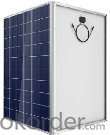
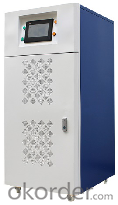
3. Product list
| No. | Item | Spec. | Qty | Unit |
| 1 | Solar Panels | 300W | 99 | pcs |
| 2 | PV Inverter with controller built-in | GSA220 | 1 | set |
| 3 | Controller | 220V 150A | 1 | set |
| 4 | Mounting racks | 30000W | 1 | set |
| 5 | DC Cables | 4mm2 | 500 | meters |
| 6 | AC Cables | 3x16+1x10mm2 | 50 | meters |
| 7 | MC4 Connectors | F&M | 40 | set |
| 8 | GEL Battery | 12V 200Ah | 54 | pcs |
4. Remark
-In rainy days, the battery can support 18500W load work 5hours.
-The maximum power load should not exceed 22KW (including inductive load impact: such as refrigerators, air conditioners, washing machines, etc. with motor load).
-The battery can be fully charged in 5-6hours under STC sunshine condition.
5. Package
Wooden case or carton pallet packing
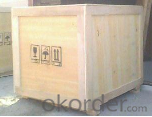
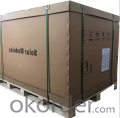
- Q: Can solar energy systems be used in areas with limited access to sunlight due to shading from nearby buildings or structures?
- Solar energy systems can still be used in areas with limited access to sunlight due to shading from nearby buildings or structures, but their efficiency may be reduced. It is important to design and position the solar panels properly to maximize exposure to sunlight throughout the day. Additionally, advanced technologies like solar tracking systems or micro-inverters can help mitigate the impact of shading, making solar energy viable even in shaded areas.
- Q: Can a solar energy system be installed in a coastal area?
- Yes, a solar energy system can be installed in a coastal area. In fact, coastal areas can be ideal for solar installations due to the abundance of sunshine and the potential for strong winds, which can help keep the solar panels cool and increase their efficiency. However, it's important to consider the potential impact of saltwater corrosion on the system's components and to use appropriate materials and maintenance practices to ensure its longevity.
- Q: What is the impact of roof pitch on the performance of solar panels?
- The performance of solar panels is significantly impacted by the roof pitch, which refers to the angle at which the roof is sloped. Various factors, such as geographical location and desired energy output, determine the ideal roof pitch for solar panels. One of the main effects of roof pitch on solar panel performance is the amount of sunlight the panels receive. The angle of the roof determines how directly sunlight hits the panels. Generally, a steeper roof pitch allows for better solar panel performance as it maximizes sun exposure throughout the day. This is particularly important in areas with lower solar irradiance or during seasons with shorter daylight hours. Another important factor to consider is the self-cleaning effect of roof pitch. A steeper roof angle helps rainwater naturally clean the solar panels, reducing the accumulation of dust, dirt, and debris. This helps maintain panel efficiency over time, as a cleaner surface enables better light absorption. Moreover, the roof pitch impacts the efficiency of snow shedding. In regions with heavy snowfall, a steeper roof pitch allows snow to slide off more easily, preventing snow accumulation on the panels and ensuring their functionality during winter months. However, it's important to note that the impact of roof pitch on solar panel performance is not linear. While a steeper roof pitch can offer advantages, there is an optimal angle that maximizes energy production based on the specific latitude of the installation site. This is typically calculated by considering factors such as the sun's angle of incidence and the time of year. In conclusion, the roof pitch plays a crucial role in the performance of solar panels by affecting sunlight exposure, facilitating self-cleaning, and aiding snow shedding. Choosing the appropriate roof pitch based on geographical location and energy goals is essential to optimize the efficiency and effectiveness of solar panel installations.
- Q: Are there any government incentives or rebates for installing solar energy systems?
- Yes, there are various government incentives and rebates available for installing solar energy systems. These incentives can vary based on location, but commonly include federal tax credits, state and local rebates, grants, and loans. These incentives aim to promote the adoption of renewable energy and help offset the upfront costs of installing solar panels. It is advisable to check with local authorities or consult with a solar installation company to determine the specific incentives available in your area.
- Q: How does a solar thermal system use sunlight to heat water or air?
- A solar thermal system uses sunlight to heat water or air by capturing the solar energy through solar panels or collectors. These panels contain tubes or pipes filled with a heat transfer fluid, such as water or antifreeze. When sunlight hits the panels, the fluid inside absorbs the heat and becomes hot. This hot fluid is then circulated through a heat exchanger, where it transfers its heat to the water or air that needs to be heated. In this way, solar thermal systems harness the energy from sunlight to provide a sustainable and efficient method of heating water or air.
- Q: What is the role of combiners in a solar energy system?
- The efficient management of electricity flow generated by multiple solar panels is the main role of combiners in a solar energy system. Typically located near the panels, a combiner box or panel acts as a central junction point for the individual DC outputs from the panels. One important function of a combiner is to merge the DC outputs from multiple panels into a single output, which is then sent to the inverter for conversion into AC electricity. This AC electricity can be used to power homes or businesses. Combiners also have a crucial role in ensuring system safety. They often include overcurrent protection devices, such as fuses or circuit breakers, to prevent damage in the event of a short circuit or overload. By integrating these protective devices, combiners help prevent potential electrical hazards and maintain the longevity of the panels and other system components. Furthermore, combiners may also incorporate monitoring systems that allow users to track and analyze the performance of individual panels or the entire system. This monitoring capability helps identify any issues or malfunctions, enabling timely maintenance or repairs to optimize efficiency and output. In conclusion, combiners are vital components in a solar energy system as they consolidate DC outputs, provide overcurrent protection, and enable system monitoring. Their role ensures efficient electricity distribution, system safety, and facilitates performance monitoring for optimal functioning of the solar energy system.
- Q: Can a solar energy system withstand extreme weather conditions?
- Certainly, extreme weather conditions pose no challenge for a solar energy system. Solar panels boast a sturdy design that enables them to endure diverse weather phenomena, such as scorching heat, freezing cold, fierce winds, heavy downpours, and even snowfall. These panels are crafted with tempered glass and often undergo rigorous testing to ensure their resilience against hailstorms or excessive snow loads. Moreover, solar panels are securely installed to withstand powerful gusts and are engineered to resist corrosion. In essence, although extreme weather conditions may slightly affect solar energy production, solar energy systems are purposefully constructed to persist and function optimally in various weather conditions.
- Q: What is net metering and how does it work?
- Net metering is a billing arrangement that allows individuals or businesses with solar panels or other renewable energy systems to receive credit for any excess electricity they generate and feed back into the grid. The process of net metering works by installing a bi-directional meter that can measure both the electricity consumed from the grid and the excess electricity generated by the renewable energy system. When the renewable energy system produces more electricity than is being used, the excess is sent back to the grid, and the meter runs in reverse, effectively crediting the system owner for the surplus energy. This credit can then be used to offset the electricity consumed from the grid during times when the renewable energy system is not generating enough power, such as at night or during cloudy days. The system owner only pays for the net amount of electricity used from the grid, which is the difference between the electricity consumed and the electricity generated. Net metering provides several benefits. First, it allows individuals and businesses to reduce their electricity bills by offsetting their consumption with the excess energy they generate. Second, it promotes the use of renewable energy sources, as it provides a financial incentive for individuals to invest in solar panels or other renewable energy systems. Moreover, net metering helps to reduce the strain on the electrical grid by distributing the generation of electricity across multiple sources. Net metering policies and regulations vary by country and state, so it is important for individuals and businesses to familiarize themselves with the specific rules and guidelines in their area. Overall, net metering is a win-win solution that benefits both renewable energy system owners and the environment.
- Q: What is the role of combiner boxes in a solar energy system?
- Combiner boxes play a crucial role in a solar energy system as they act as a central hub for connecting and protecting multiple solar panel strings. They combine the electrical output from these strings and direct it towards the inverter, ensuring efficient power generation and optimal system performance. Additionally, combiner boxes include safety features such as fuses and surge protectors, preventing any electrical damage or fire hazards.
- Q: Can solar energy systems be used in multi-story buildings?
- Yes, solar energy systems can certainly be used in multi-story buildings. They can be installed on rooftops, terraces, or other available open spaces to harness sunlight and generate electricity. In fact, multi-story buildings often have larger roof areas, which can accommodate a greater number of solar panels, allowing for more efficient energy production. Additionally, advancements in solar technology, such as the use of thin-film solar panels, have made it easier to integrate solar systems into the facade and windows of multi-story buildings, further expanding their potential use in these structures.
Send your message to us
30kW Solar Off-Grid Power System - Solar Energy Systems in Geelong
- Loading Port:
- China main port
- Payment Terms:
- TT OR LC
- Min Order Qty:
- 1 set
- Supply Capability:
- 500 set/month
OKorder Service Pledge
OKorder Financial Service
Similar products
Hot products
Hot Searches
Related keywords
